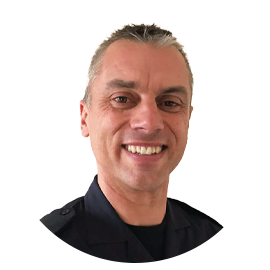Falls and frailty
In Dorset, there are 9,452 65+ year-olds with a moderate or high risk of fall within the next 12 months.
A high percentage of falls that happen in the community or at home will require an ambulance to attend, and many will require a stay in hospital due to an injury.
A lot of falls will result in a hip fracture which reduces a person’s independence and life expectancy. Mortality rates indicate that 20% of people who sustain a hip fracture are likely to die within a year of their injury.
You are also 12% more likely to be admitted as an emergency for a fractured hip from a fall if you are over 65 and live in the BCP Council area compared with the national average.
We need to recognise frailty conditions much earlier. Across our organisations there are lots of opportunities for us to intervene and prevent these falls from happening.
Dorset & Wiltshire Fire and Rescue Service work with other agencies to offer support and advice in a variety of different areas. This targeted engagement with a vulnerable group within the community is a good example of partner collaboration by linking the fire service with areas that have identified people at medium to high risk of a fall.
During 2021/22 4,441 Safe and Well visits were completed in Dorset. Of those 2,293 were in the BCP Council area and 2,148 in the Dorset Council area.
Case Study: Primary care working in partnership with Dorset Healthcare and
BCP Council
The team works to support people with a degree of frailty that are at risk of hospital admission. They provide early support with the aim of keeping people living as independently as possible and in their own homes.
The aim is to help people manage their long-term conditions and to look at future care needs before they become urgent.
“Working with others, such as the voluntary sector, means we can help address issues of social isolation and loneliness. We can also link with other support, such as mental health services, so support can be put in place quickly when it’s needed.”
Frailty team, North Bournemouth
Case Study: Anticipatory Care team
A highly innovative Falls Buddy scheme has been set up by the Blackmore Vale Partnership. The aim of the scheme is to reduce social isolation, reduce the risk of falls, and encourage vulnerable adults to engage with social activities in their local community.
The service aims to promote independence and is offered to people at a lower risk of falls and targeted to those living alone. Support is given for 8-12 weeks and focuses on maintaining mobility, functional strength, and balance as well as social confidence.
“As a result of participating in the Altogether Better initiative, Blackmore Vale Partnership has worked collaboratively with volunteer Health Champions for several years. This experience continues to demonstrate the importance to wellbeing of feeling connected to your local community. Volunteers are trained by a Community Rehabilitation Team physiotherapist and support people with exercises linked to regular social activity. The feedback so far suggests that the scheme can be equally beneficial to the volunteer as it is to the person they are ‘buddied’ with.”
Keith Harrison, wellbeing team lead

